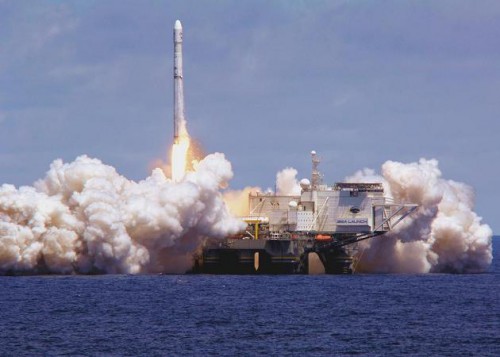
On Friday, February 1, a Sea Launch Zenit-3SL rocket experienced a malfunction shortly after lift-off that caused the rocket’s engine to shut down. This resulted in both the launch vehicle and its Intelsat 27 payload to fall into the ocean. Launch occurred on the Odyssey Launch Platform at 1:56 a.m. EST (0656 GMT). This is the latest in a series of failures for a company that has had a bumpy road since its foundation in the mid ’90s.
The Intelsat 27 spacecraft was built by Boeing’s Space and Intelligence Systems and is based on the Boeing 702MP satellite bus. The spacecraft was supposed to provide fifteen years worth of service to clients in the U.S., South America, and Europe, and would have resided in a geostationary orbit.
Sea Launch issued a statement following the accident expressing its assurances that it will work to get to the root cause of the accident. Currently, other than the fact that failure happened about 40 seconds after launch, few details have been released.
“We are very disappointed with the outcome of the launch and offer our sincere regrets to our customer, Intelsat, and their spacecraft provider, Boeing,” said Kjell Karlsen, president of Sea Launch AG. “The cause of the failure is unknown, but we are evaluating it and working closely with Intelsat, Boeing, Energia Logistics Ltd., and our Zenit-3SL suppliers. We will do everything reasonably possible to recover from this unexpected and unfortunate event.”
Sea Launch issued a press release shortly after the loss to announce that it will establish a Failure Review Oversight Board to determine the cause of the accident. The company has stated that as information becomes available it will be posted on Sea Launch’s website: www.sea-launch.com.
The company utilizes the Zenit 3SL to send payloads to orbit from the unique launch site of the Pacific Ocean. Sea Launch uses a floating, mobile launch pad which uses the Odyssey and Sea Launch Commander platforms to launch payloads from directly on the Earth’s equator. The vessels’ home port is located in Long Beach, Calif. The concept behind this is stated by the company as offering “ … the most direct and cost-effective route to geostationary orbit.”
Sea Launch is a relatively new aerospace company, having been established in 1995 by a group of companies based in Russia, Norway, the Ukraine, and the U.S. The private space firm has launched a total of 31 rockets, with three of those being total failures and one partial failure. The provider of the Sea Launch service, Sea Launch Co. LLC, filed for Chapter 11 bankruptcy in June 2009. The company came out of bankruptcy in October 2010.
This recent failure adds to a string of incidents stretching back some 15 years. In 1998, Boeing was fined $10 million by the U.S. Department of State for violating the Arms Export Control Act. This was due to Boeing’s handling of missile technology with Sea Launch’s partners. To date, this is the largest fine of its kind. During the investigation Sea Launch was shut down for two months.
During the same time frame as the Boeing investigation, U.S. Customs worked to block Sea Launch from having the Zenit rocket delivered to California, as the rocket components were classified as missile technology. However, the issue was resolved in favor of Sea Launch.
Then, of course, there are the four partial or total failures of the Zenit itself. In 2000, the ICO-F1 spacecraft was lost, and four years later Telstar-18 was launched, but the Zenit rocket performed less than expected, requiring the Telstar-18 to use its fuel to make up for the rocket’s deficiency. Three years later, in 2007, the NSS-8 satellite was destroyed when the Zenit launch vehicle exploded. Most recently there was this loss. Whether it will impact the company’s future remains to be seen.
Since this article was posted, The Boeing Company has filed a suit against the international partners that constitute the Sea Launch consortium. The reason for the suit stems from Boeing stating that Sea Launch needs to be reimbursed for its investments in the private space company. The suit was filed in federal court in Los Angeles, California.
Boeing claims that two of the other companies within Sea Launch, RSC Energia and Yuzhnoye SDO have backed out of an agreement to reimburse Boeing if Sea Launch failed. As it currently stands Energia and Yuzhnoye own 95 percent of Sea Launch with Boeing and another firm owning the remaining five percent. The amount that Boeing is stating is owed them is approximately $350 million. Boeing filed the suit the day of Sea Launch’s most recent failure – Friday, Feb. 1, 2013.



